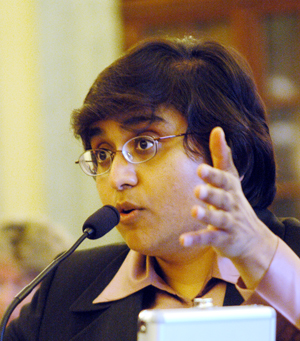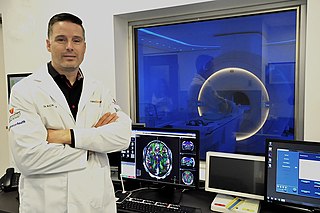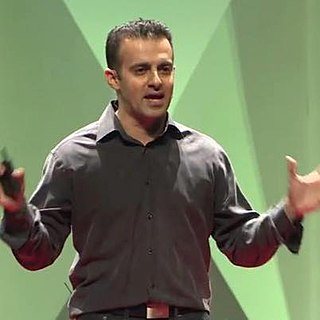
Robert Samuel Langer Jr. FREng is an American biotechnologist, businessman, chemical engineer, chemist, and inventor. He is one of the nine Institute Professors at the Massachusetts Institute of Technology.
Daniel John DiLorenzo is a medical device entrepreneur and physician-scientist. He is the inventor of several technologies for the treatment of neurological disease and is the founder of several companies which are developing technologies to treat epilepsy and other medical diseases and improve the quality of life of afflicted patients.
The Kenya Medical Research Institute (KEMRI) is a state corporation established through the Science and Technology (Amendment) Act of 1979,, during the tenure of Nicholas Biwott as Minister of State, as the national body responsible for carrying out health research in Kenya.

Anita Goel is an American physicist, physician, and scientist in the emerging field of Nanobiophysics. At the Nanobiosym Research Institute (NBS), Goel examines the physics of life and the way nanomotors read and write information into DNA.

Walter De Brouwer is a Belgian-born businessman and semiotician. He is the former CEO of doc.ai and of Scanadu. As a businessman, as of 2013, he took part in the creation of over 35 companies, including two that became publicly traded through Initial Public Offering.

The Biomedical Advanced Research and Development Authority (BARDA)' is a U.S. Department of Health and Human Services (HHS) office responsible for the procurement and development of medical countermeasures, principally against bioterrorism, including chemical, biological, radiological and nuclear (CBRN) threats, as well as pandemic influenza and emerging diseases. BARDA was established in 2006 through the Pandemic and All-Hazards Preparedness Act (PAHPA) and reports to the Office of the Assistant Secretary for Preparedness and Response (ASPR). The office manages Project BioShield, which funds the research, development and stockpiling of vaccines and treatments that the government could use during public health emergencies such as chemical, biological, radiological or nuclear (CBRN) attacks.
Bin He is a Chinese American biomedical engineering scientist. He is the Trustee Professor of the Department of Biomedical Engineering, professor by courtesy in the Department of Electrical and Computer Engineering, and Professor of Neuroscience Institute, and was the head of the department of Biomedical Engineering at Carnegie Mellon University. Prior, he was Distinguished McKnight University Professor of Biomedical Engineering and Medtronic-Bakken Endowed Chair for Engineering in Medicine at the University of Minnesota. He previously served as the director of the Institute for Engineering in Medicine and the Center for Neuroengineering at the University of Minnesota. He was the Editor in Chief of the IEEE Transactions on Biomedical Engineering and serves as the editor in chief of IEEE Reviews in Biomedical Engineering. He was the president of the IEEE Engineering in Medicine & Biology Society (EMBS) from 2009 to 2010 and chair of International Academy of Medical and Biological Engineering from 2018 to 2021.
Michelle Khine is an American bioengineer who is a distinguished scientist and innovator at the University of California, Irvine, co-founder of Fluxion Biosciences Inc., the scientific founder of the Shrink nano-technology platform, as well as the Assistant and Founding Professor of the School of Engineering at UC Merced. Khine, an associate biomedical engineering professor in the Henry Samueli School of Engineering, is responsible for experimenting with childhood toys Shrinky Dinks to build microfluidic channels. Her research has enabled technological advances in industries including biological research and medical diagnostics.
Innovations in International Health (IIH) was an innovation platform that facilitated multidisciplinary research to develop medical technologies for developing world settings at MIT. It was based at the Massachusetts Institute of Technology from 2008 through 2012. IIH's mission was to accelerate the development of appropriate and affordable health technologies by facilitating collaboration between researchers, users and health practitioners around the world.
EHealth Point are model public health units, owned and operated by Health Point Services India (HSI), a for-profit making company launched in 2009. The units provide families in rural villages with clean drinking water, medicines, comprehensive diagnostic tools, and advanced tele-medical services that “bring” a doctor and modern, evidence-based healthcare to their community. The program was initially launched in India and has plans to expand to South America and Africa.
Suman Chakraborty is a professor at the Indian Institute of Technology Kharagpur and Sir J. C. Bose National Fellow. He has been the first in the history of IIT Kharagpur to be bestowed by the National Award for Teachers in the Higher Education Category by the honourable President of India. He is also Institute Chair Professor Awardee of 2023. He has served as the Dean, Research and Development, Associate Dean and the Head of the School of Medical Science and Technology of the Institute. He has also been National Academy of Engineering Chair Professor. He joined the Institute in 2002 as Assistant Professor and has been a Full Professor since 2008.
Ryan Bethencourt is an American scientist, entrepreneur, and biohacker best known for his work as co-founder and CEO of Wild Earth, Partner at Babel Ventures and cofounder and former Program Director at IndieBio, a biology accelerator and early stage seed fund. Bethencourt was head of life sciences at the XPRIZE foundation, a co-founder and CEO of Berkeley Biolabs, a biotech accelerator, and Halpin Neurosciences, an ALS therapeutics-focused biotech company. Bethencourt co-founded Counter Culture Labs, a citizen science nonprofit, and Sudo Room, a hacker space based in downtown Oakland, California.

Ryan C.N. D'Arcy is a Canadian neuroscientist, researcher, innovator and entrepreneur. D'Arcy co-founded HealthTech Connex Inc. where he serves as President and Chief Scientific Officer. HealthTech Connex translates neuroscience advancements into health technology breakthroughs. D'Arcy is most known for coining the term "brain vital signs" and for leading the research and development of the brain vital signs framework.
Dhairya Dand is an Indian-American inventor and artist based in New York City.

Roozbeh Ghaffari is a biomedical engineer and neuroscientist. He is currently CEO and co-founder of Epicore Biosystems, research associate professor at Northwestern University's Biomedical Engineering Department, and Director of Translational Research in the Querrey Simpson Institute for Bioelectronics.

David Moinina Sengeh is a Sierra Leonean politician who has served as the chief minister of Sierra Leone after being appointed by President Julius Maada Bio in 2023. He previously served as the minister of basic and senior secondary education and chief innovation officer for the Directorate of Science, Technology and Innovation. He is a TED Senior Fellow.
Marzyeh Ghassemi is a Canada-based researcher in the field of computational medicine, where her research focuses on developing machine-learning algorithms to inform health-care decisions. She is currently an assistant professor at the University of Toronto's Department of Computer Science and Faculty of Medicine, and is a Canada CIFAR Artificial Intelligence (AI) chair and Canada Research Chair in machine learning for health.
Ida Pavlichenko is an Azerbaijani biomedical engineer and a Technology Development Fellow at the Harvard University Wyss Institute for Biologically Inspired Engineering. Pavlichenko is the co-founder and chief executive officer of PionEar Technologies, a medical device company that develops intelligent technologies for treating ear and hearing disorders. The tympanostomy technology she invented for treated recurrent ear infections has been nationally recognized for its innovative design which addresses many of the limitations of current ear tubes.
Healthy.io is a health care company offering remote clinical testing and services enabled by smartphone technology. Launched in 2013 by founder and CEO Yonatan Adiri, the company uses smartphones to enable at-home diagnostics testing for the detection of signs of kidney disease, urinary tract infections, and pregnancy complications. Its digital wound management solution is used by medical personnel to measure and track wounds using a smartphone.
The Wyss Institute for Biologically Inspired Engineering is a cross-disciplinary research institute at Harvard University focused on bridging the gap between academia and industry by drawing inspiration from nature's design principles to solve challenges in health care and the environment. It is focused on the field of biologically inspired engineering to be distinct from bioengineering and biomedical engineering. The institute also has a focus on applications, intellectual property generation, and commercialization.







